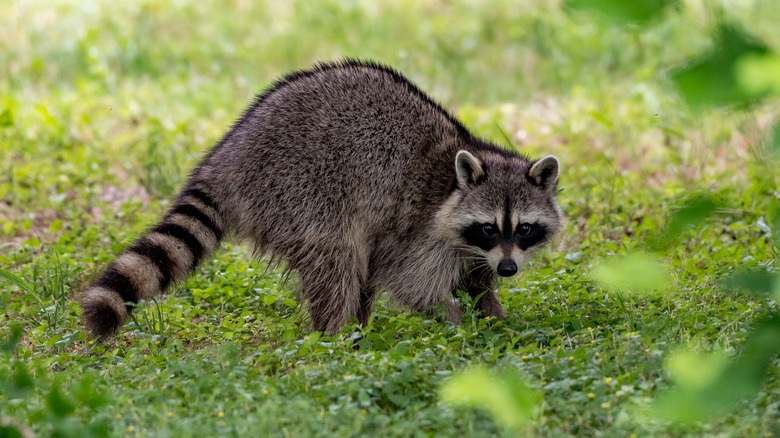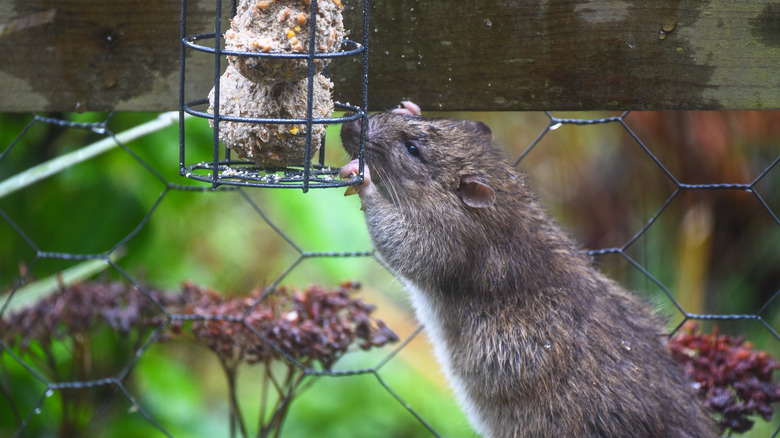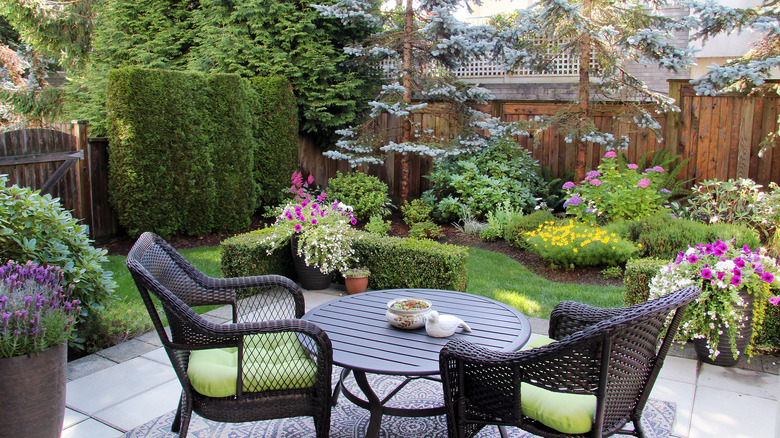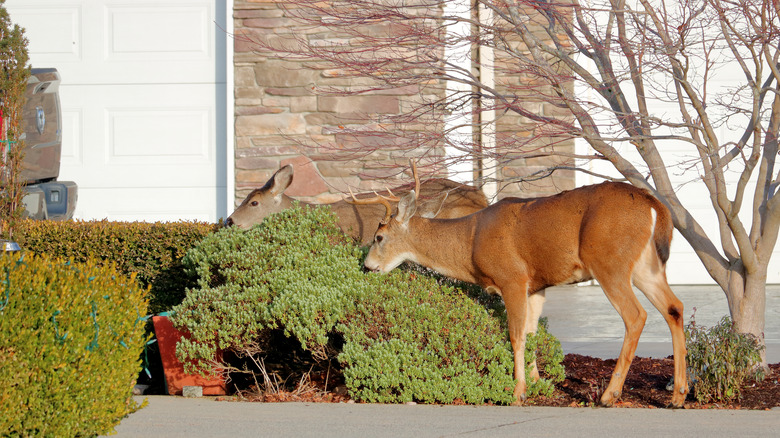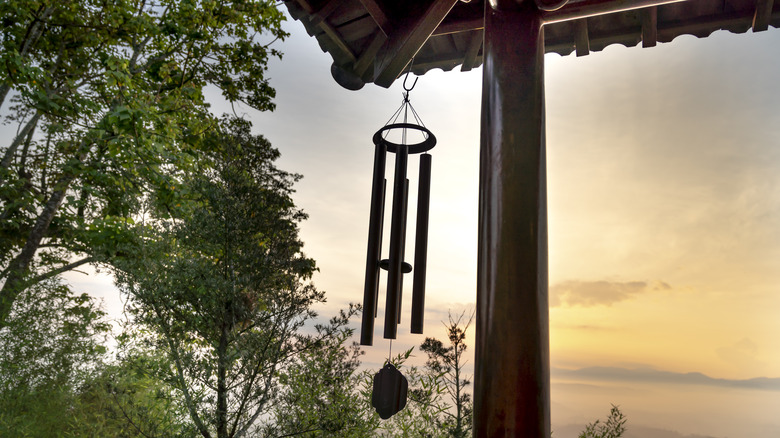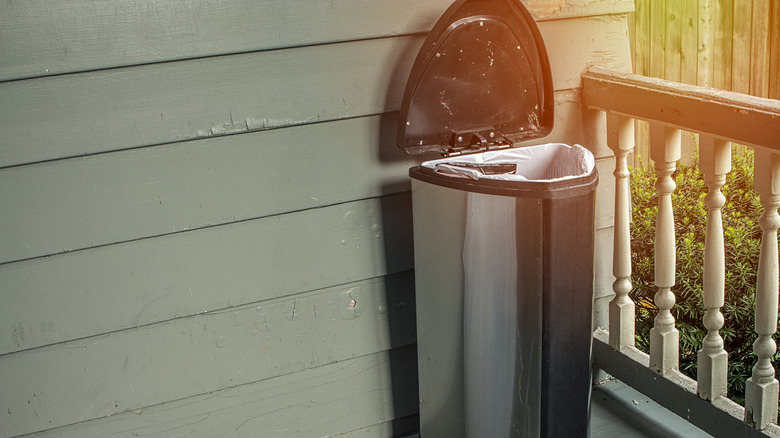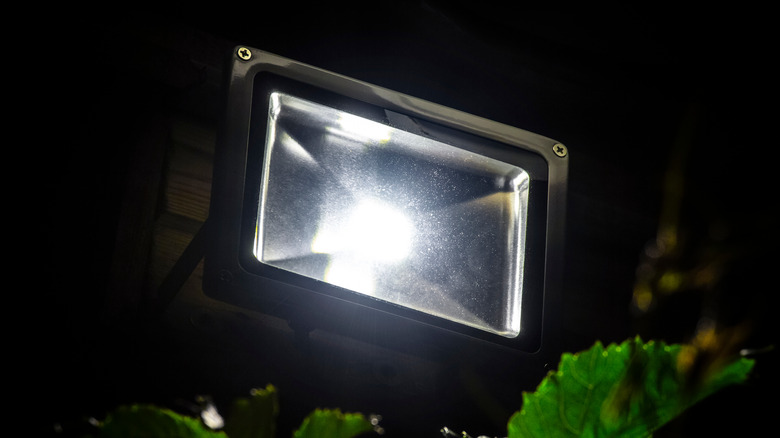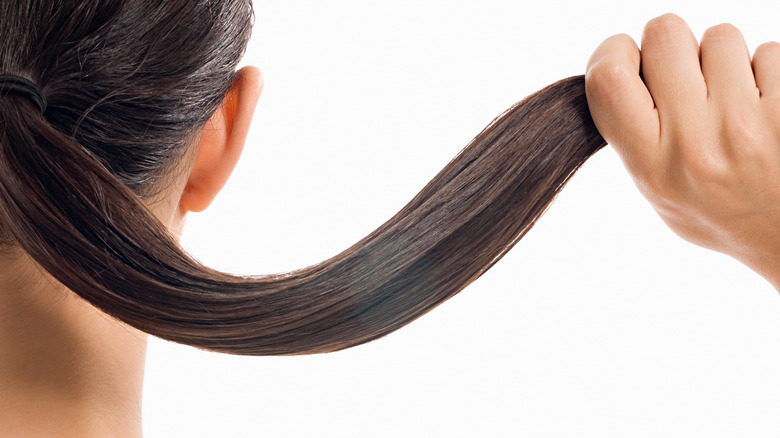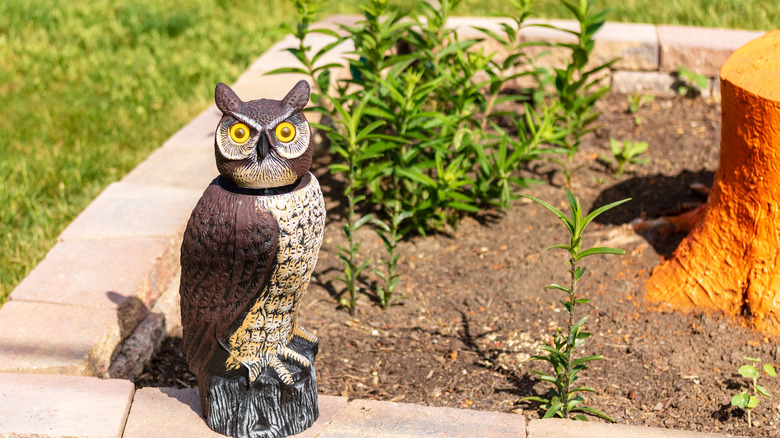Humane Ways To Keep Critters Out Of Your Yard
Our yards are a perfect way for us to reconnect with nature and unwind after the hustle and bustle of the workday. When you're at your wit's end there's nothing quite like the song of a blackbird, the dance of a butterfly, or the hypnotic buzz of a bee to get things in perspective. Walking barefoot across the grass and waving to the chirping bluebirds is good for your sense of well-being. Seeing a deer or rabbit lay waste to your little corner of the Earth isn't.
We all want our yards to be wildlife friendly to a degree. However, when it comes to nightly home invasions by hordes of curious critters, things can get a little fraught and it's time to take action. Frogs, toads, and birds usually aren't a problem. However, hordes of insatiable raccoons, foxes, and skunks can be. These rampaging little critters can undo hours of hard work in the space of minutes. All of these critters have a place in the ecosystem. Though you may want to keep them out of your yard, and you might want to handle things humanely. Here's how!
Know your enemy
Furry little friends may be uber cute and mean no harm to anyone outside of their habitats. However, when they stray from their domain and threaten the sanctity of your yard and your trashcan's security, it's game on! Offense is always the best defense! But before you take the battle to the invading army, you need to know exactly what kind of critter you're up against. So take a little time to study their habits and behaviors.
Deer make look like innocence personified. Yet if your fruits and vegetables are vanishing at an alarming rate, one of these forest friends could be paying you regular visits. Rabbits will also devour your plants, and stray cats and raccoons tend to raid trashcans. Skunks will steal your fruits and leave an unmistakable odor in their wake. Groundhogs, gophers, chipmunks, and moles love to dig and leave a merry trail of destruction under your lawn. Squirrels will target your birdfeeders, and opossums and foxes will nibble on fruit. Understand what your dealing with and what makes your yard so attractive to these critters in the first place. Then put a strategy in place to keep them out.
Fences are a good first-line defense
For centuries people have been carving up land with fences and making their outdoor space their own. It's where the concept of yards comes from and when it comes to humanely keeping critters out, fences are often still your best defense. Flora and hedges may be more eye-pleasing and complementary to your yard than a stark and unforgiving perimeter fence. However, they offer nowhere near the same sort of security and protection from the hordes of inquisitive and determined critters looking to get in. If local government and residential association rules allow it may be time to build a fence to protect your space.
There are various types of fencing on the market, such as brick walls, stone walls, chain link, wood, and aluminum. It's always worth bearing in mind that a fence's main function is to create a barrier. A sturdy, reasonably high, and well-erected fence can stop a host of critters, such as deer in their tracks, but more importantly, it will not harm them. Fences will also enhance the overall privacy and security of your yard. However, because critters such as raccoons, opossums, and moles can climb, jump, or dig under a fence you may want to look at other humane measures as well.
Your four-legged friend will serve as a round-the-clock security guard
Dogs are often described as our best friends for a reason. For centuries they have helped people hunt for food and protected properties when curious critters draw close. Cats are adept at keeping yards free of rodents and other small furry animals. Yet their methods of dealing with them are often not what you'd call humane. Additionally, roaming felines often pose a big threat to feathered friends. Dogs on the other hand, like to bark and growl. This is often enough to scare away the most determined intruder from viewing your yard as a free-for-all.
A canine's hearing and sense of smell are supercharged. They can detect the tread of a trespasser, or the unwelcome stench of an interloper way before you even know there's a pest around. And if there's one thing dogs don't like, it's an uninvited guest on their patch. Unlike cats, dogs can be less likely to capture and maim or kill any critters who have entered your yard. Their presence will often be enough to scare trespassers off and hopefully keep them off. As dogs are also notoriously light sleepers, they'll often detect the slightest noise at any time of the day or night. All in all, they're the perfect round-the-clock security guard.
Plant some deterrents
Plants are pretty yard additions and can boost your curb appeal. Putting plants in your yard is also a great humane hack to deal with unwelcome critters. The trick is finding the right plant species that will also thrive in your yard's conditions. Bee-friendly garden plants such as basil, borage, chives, dill, and dahlias can help repel destructive insects such as flies, mosquitoes, beetles, and ants.
Everyone loves a daffodil, except mice, voles, and squirrels, who find its bulbs toxically repellent. Purple coneflower and lemongrass also work great at keeping rodents out. If you've got a deer problem, the Russian sage has an aroma they just cannot stomach. The flowering herb yarrow is also good for deterring deer. If you've got some troublesome moles or rabbits frolicking through your flowerbeds, then plant a little garlic to drive them out. You can also plant some onions alongside your garlic to create a smell that deer will go out of their way to avoid because it reduces their ability to sniff out predators.
Wind chimes work a lot of the time
Few things are as peacefully whimsical as a wind chime on a lazy summer afternoon. They've been hung around properties for thousands of years, and not just because they're easy on the ear. Early wind chimes were made out of dry bamboo pieces or shells and bones and used by ancient farmers to keep the birds from their crops. So if you want to encourage a host of feathered fancy into your yard, don't hang the wind chimes near a bird feeder. However, if you want to prevent deer from visiting, some wind chimes could be just the solution.
The melancholy lament of wind chimes may lull us into a hypnotic trance. Yet to our furry and fruit and veggie-eating friends, the noise they make is both startling and unsettling. Although a deer's hearing isn't all that much different from humans, they like to live in the tranquility of dense and dark woodland far from the noise of modern life. As such when the wind blows those chimes, deers who are skittish and prone to panic by disposition, tend to immediately bolt. Yet be warned, that familiarity reduces fear over time. Some deer will soon realize that apart from the noise, your wind chimes pose no real threat. So, it's best to make wind chimes a part of your overall strategy and not your sole line of defense.
Have a smart trash strategy
You'd be surprised how many critters visit your yard solely to rummage through your trash in search of rich pickings. Make sure to tightly close the trash can and avoid unprotected bags of trash. If you don't have a locking lid, secure your trashcan with a heavy brick or straps. This will deny opportunistic scavengers such as raccoons, rats, skunks, and squirrels the freedom to feast.
It's best to keep your trash can in the garage if possible. But if you need to keep it outdoors, moving your trashcan away from trees, walls, and fences also makes it harder for little furry friends to gain easy access. It's also a good idea to double-bag your garbage as an added deterrent. You can even purchase rodent-repelling trash bags that are scented to keep them away. To keep other pest-attracting odors at bay, make sure to clean your trash cans thoroughly and regularly.
A little castor oil is a slick solution
Castor oil is a vegetable oil sourced from the Ricinus communis plant. You can find it in food, medicine, biodiesel food, and skin care products. The unmistakable aroma and the distinctive taste of castor oil disgust critters. As a non-toxic and natural pesticide castor oil is perfectly safe for animals and the environment. The oily formula works a treat at stopping critters who like to tunnel and dig such as moles and voles without poisoning them. Castor oil is also harmless to children and pets.
For best results create a concentrated mixture of two-thirds castor oil and one-third dish soap. Add two tablespoons of this to a gallon of water and spray the areas you wish to protect. It will soak into the soil and get to work at keeping your unwanted guests at bay. You will need to apply a little to your yard weekly for maximum effect, but you should soon reap the rewards.
Floodlights can help you fight the good fight
Critters of the night love shadows and dark corners as much as they hate to be exposed to the beam of bright light. With the installation of floodlights, an unwanted visitor will get the message that your yard is not a safe place to be. The shock and awe of motion-activated floodlights will startle and expose wandering critters without hurting them. This can work effectively at persuading raccoons, skunks, and opossums that your yard is a no-go zone. Additionally, motion-activated floodlights are better for the environment and your wallet because they are not on permanently.
Ideally, the higher up you install floodlights the better. Near a roof or on top of a garage is ideal. Identify what area of your yard is most at risk from wandering critters and ensure the floodlights are positioned to effectively illuminate it. Research the measurements of the area you need to cover and if a high-wattage sodium light would be more effective than a regular incandescent floodlight. It's also wise to locate the power source you will be using for your floodlights before you install them. If in doubt about your ability to install the lights, contact a professional.
Try some plant protectors or raised garden beds
Sometimes the most simple solutions are the most effective. If you want to prevent those perpetually ravenous critters from eating your plants, then move your fruits, flowers, and vegetables out of sight and out of mind. Admittedly, a container or raised bed only works if you have a small garden. However, it can help deter rabbits and other small critters from chomping down on the vegetables you have worked so hard to cultivate.
Unfortunately, when it comes to larger intruders, an elevated bed just isn't going to cut it. They present no real challenge for the nimble and athletic prowess of a critter such as a squirrel. So what alternatives are there? A plant tent may look unsightly but it can add a little extra protection to the crops that need it most. A wire cloche, which can be easily made from chicken wire is also a handy hack if there's a specific plant you want to protect from a hungry critter's teeth. Your best solution is to combine elements from all three options. By protecting your raised bed with a little wire covering you're getting the best of both worlds.
Unwashed human hair is an old trick
It may sound like witchcraft but a little bit of unwashed human hair can be enough to convince critters that predators are nearby and your yard should be avoided. An Oregon State University report states that human hair is mainly carbon. Yet it also contains significant amounts of hydrogen, nitrogen, oxygen, and sulfur, making it a godsend for your soil, and a good first line of defense against unwelcome critters. Double whammy!
Spread the hair liberally around the perimeter of your yard to keep the bunnies at bay. You can deter deer by placing a bundle of hair in a small bag and hanging it from something high. Deers loathe the smell and will keep their distance. A few strands of human hair placed around certain plants may also be enough to slow the advance of any snails. The scent of human hair doesn't usually last very long, so ensure you replace it regularly. For more options, you can also throw dog and cat hair into the mix.
Use a plastic predator to scare off critters
Owls are the natural predator of squirrels, rabbits, rats, mice, weasels, and chipmunks. A plastic but realistic owl perched on your property can send shivers up these little critters' spines. Place these near gardens, trash cans, or anywhere you've had pest problems to deter these animals from visiting.
Animals can be smart and will soon realize your owl is nothing more than a lifeless lump of plastic if it doesn't look and act like the real deal. So ensure it's lifelike and move your plastic owl around the garden at regular intervals. It's often wise to hang it by a piece of rope so it can move with the wind. This gives off the illusion of flight to critters who don't know any better. You can also purchase plastic owls that have integrated sound and automatically rotating heads to realistically imitate the real deal.
Secure your sheds and install motion-censored deterrents
Prevention is key when it comes to keeping unwanted critters like raccoons out of your yard. As well as identifying existing food supplies that might be luring them in, securing your sheds is a massive must-do! Critters are drawn to the safety and shelter a shed offers, particularly if it contains birdseed or other nibbles that pests enjoy. By securing your sheds and other cavities, you're denying raccoons and rodents a place to regularly visit and lay low during the winter months.
Ensure all the holes in the floor and cracks in the wall of your shed are sealed and secured. It's never a good idea to keep a trashcan in or near a shed because critters may come for a meal and stay for the shelter. Seed bags should always be contained in a sealed plastic container. Additionally, if there is a space of a few feet between your shed and the ground, it's advisable to secure the gap with chicken wire.
